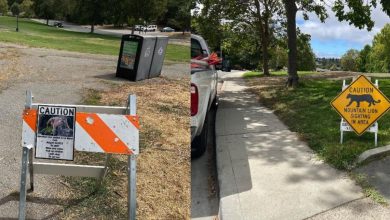Rajah Caruth: Young Trailblazer of NASCAR

By Magaly Muñoz
ELITE Public School staff and students staged a sit-in at Vallejo City Hall on Wednesday afternoon to protest the City Council’s decision to vote against their Major Use Permit to expand into downtown.
“We are deeply troubled by the turnover of the 6-1 vote, which we believe to be red-lining in 2024,” said Dr. Ramona Bishop, CEO of ELITE Public Schools. “We have followed all the requirements set forth for approval by the city and are dismayed by this sudden reversal of fortune. Our sit-in at City Hall is a testament to our unwavering commitment to justice and fairness.”
The sit-in was triggered after the Vallejo City Council members held a lengthy, special meeting on Tuesday evening to continue discussing the April 23 appeal that was made against the Planning Commission’s decision to grant ELITE a permit for expanding their charter high school into a retrofitted building in the heart of downtown.
During the deliberations, various options were presented to the Council for approving the project. These included a provisionary review period for the permit and imposing extensive conditions, such as limiting student enrollment.
The ELITE plan was to accommodate a maximum capacity of 400 students at their proposed school site, starting with an initial rollout capacity of 200 students in the first year.
Bishop rejected the suggestion by the City Council for a smaller charter capacity because the funding for the school was based on the projected number of students they would eventually seat.
During the meeting, council members complained about the lack of availability of economic impact reports that assessed the school’s potential impact on Vallejo’s downtown area.
Economic Development Director Michael Nimon sent a letter to the City Council, stating that while there was no official report, schools serve as economic generators to the surrounding areas of where they’re located.
“Schools also diversify uses and create pedestrian activity by bringing more people to downtown. Diversification of uses makes local economy more resilient by balancing residential, commercial, office, entertainment, and institutional uses,” Nimon’s letter said.
The letter also states that foot traffic is needed in an area of Vallejo that currently has minimal activity and the presence of the proposed school will likely not disturb any future developments.
Despite this, the council dismissed the letter as “merely an opinion” and not anything based on fact or concrete data.
Councilmember Peter Bregenzer, who remained silent throughout most of the seven-hour discussion, ultimately motioned for City staff to draft a resolution to approve the appeal and deny the project. The motion passed by a 4-3 vote.
About 50 students gathered on the second floor of the City Hall building where they chanted “Say it loud, say it clear, we don’t want no racists here” and “Where is the mayor? Bring him out, bring him out.”
The proposed high school has sparked intense debate, with many speculating that those opposed to the school are saying no to the expansion because the majority of the students are Black and Brown.
Retired Solano County Judge Paul Beeman and his wife, Donna, who filed the appeal against the school, have consistently denied that their opposition stems from racism or personal feelings toward anyone associated with the school.
In interviews with the Post, the Beemans seem to regard the proposed high school as a “nuisance” and an ill-advised choice for downtown development. They claim that it would be ineffective in economically revitalizing the community. However, they have provided no substantial evidence to support their opinions.
In contrast, ELITE has drawn parallels to redlining in relation to the community’s opposition to the proposed school location. Redlining refers to the discriminatory practice in which mortgage companies and other financial services systematically withhold loans and access to predominantly white neighborhoods from racial and ethnic minorities, particularly Black and African American communities.
“We’ve been fighting for this school for two years. We’re going to make our emergency, their emergency,” one student said in reference to Vallejo Mayor Robert McConnell’s previous comments about not rushing to make a decision on the school permit.
Within two hours of the start of the sit-in at City Hall, the City of Vallejo issued a statement that the building would be closed for the rest of the day because of the protest. The statement said that the loud noise from the protesters “hindered staff and visitors’ ability to conduct regular business.”
Although the mayor was not present at City Hall on Wednesday afternoon, interim City Manager Beverli Marshall addressed the ELITE group to answer several questions the students had. She explained the appeal process, how the different city officials played a role in the decision, and what the possible outcomes could be after the Council makes its final decision in a few weeks.
Students and staff were ultimately upset that they were being treated like criminals and that all their work over the last two years might be in vain since they believed that the Council had zero intention of ever granting them the permit in the first place.
The City Council is scheduled to meet for another special meeting on June 4 at 7 p.m. to continue discussing the future of ELITE Public Schools.




